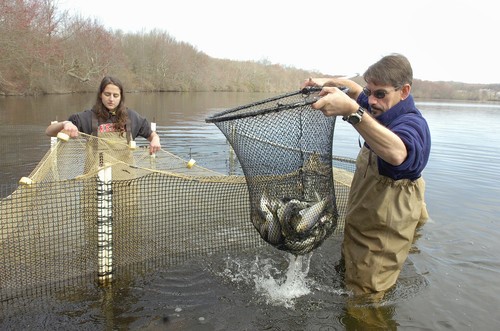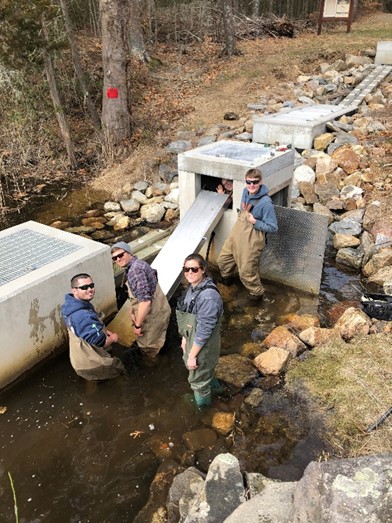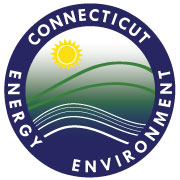Environmental Protection Seasonal Resource Assistant
Diadromous Inland Fisheries Program
Recruitment #210222-3492VR-001
| Location |
Old Lyme, CT
|
|---|---|
| Date Opened | 2/23/2021 08:15:00 AM |
| Salary | $12.00 - $14.00/hour |
| Close Date | 4/30/2021 11:59:00 PM |
Introduction


The State of Connecticut, Department of Energy and Environmental Protection (DEEP), Fisheries Division, is currently seeking to hire multiple Environmental Protection Seasonal Resource Assistants to work with the Diadromous Inland Fisheries Program.
Relevant Information:
- Location: The duty station for these field-oriented positions will be at the DEEP Marine Headquarters located at 333 Ferry Road in Old Lyme, CT.
- Hours: Up to thirty-five (35) hours per week. Work hours may vary with field activity. These positions are not to exceed 1,030 hours, or six (6) months.
- Duration: March through October 2021.
- Pay rate: $12.00 to $14.00 per hour depending on education and experience.
- Benefits: There are no benefits for these positions.

For questions about the position, please contact Timothy Wildman via email at timothy.wildman@ct.gov or via phone at (860)447-4315.
Selection Plan
These positions are non-competitive. Open to the public.
Selected candidates must, be fluent in English, be at least 18 years old, have a valid drivers license, and a clean driving record, and be able to report to the Marine Headquarters each work day.
Selected candidates must possess and maintain adequate physical flexibility, strength and stamina to perform the duties (including work outside in inclement weather, work outside for extended periods), and work well with other staff and members of the public.
PURPOSE OF JOB CLASS (NATURE OF WORK)
EXAMPLES OF DUTIES
These Environmental Protection Seasonal Resource Assistants (SRAs) will generally work outside, in the field, across the State of Connecticut helping to restore and conserve highly migratory species of fish that live in both fresh and salt water (diadromous fish species). All of these diadromous fish species migrate into fresh water from the ocean during the spring; therefore it is critical that the preferred candidate is available to begin working early to mid-March.
During this period, the SRAs will be trained by English speaking professional diadromous fish biologists and will often work side-by-side as a team with biologists and other SRAs. Once trained, SRAs may also work independently by themselves. A major objective of the Diadromous Fisheries Program is to monitor selected sites across the state for diadromous fish species. Typically, these sites are at one of many “fishways” distributed around the state; fishways are structures that enable migratory fish species to swim above a dam to get to essential habitat located upstream of the dam. Some of these fishways are equipped with monitoring equipment that allows for the counting of fish passing through the fishway. SRAs will be trained to record and download data at these sites, as well as troubleshoot monitoring equipment. SRAs will also inspect fishways and clear them of debris as necessary to ensure adequate water flows down the fishway.
In addition, SRAs will also assist in transplantation of diadromous fish. Fish are trapped at “donor” streams with strong populations, loaded into transport trucks, and taken to other streams where they are released. The fish transplanted to “recipient” streams will reproduce and help restore the population of diadromous fish in that stream. To effectively participate in this important program activity, SRAs must be able to run short distances with a net full of fish weighing up to 50 pounds.
SRAs will be trained in various methods to collect diadromous fish. Collection methods include trapping, netting (gill, seine, or hoop nets), and electrofishing. All of these collection methods require a SRA to have the ability to wade in chest-deep, flowing water over rocky uneven stream bottoms. SRAs will also be trained in species identification of collected fish, and collection of biological samples such as scale samples that can be used to determine the age of fish.
SRAs will also be trained to perform data entry, basic data analysis, and general facility maintenance. Examples of data entry and analysis activities include reviewing videos recorded at fishway monitoring sites to count number of fish passing through the facility, and entering data into Microsoft Excel spreadsheets. Facility maintenance can include general landscaping, fishway repair and maintenance, cutting grass, trimming trees and brush, cleaning, painting, and light carpentry.
Working as an SRA within the Diadromous Fisheries Program provides a great opportunity for individuals interested in learning more about fish populations and aquatic ecosystems in Connecticut. SRAs will get the opportunity to work outdoors on a variety of projects and gain basic scientific training in a fun, teamwork-oriented environment.
KNOWLEDGE, SKILL AND ABILITY
PREFERRED QUALIFICATIONS
- Recent college graduates with a degree in Fisheries Biology or general Biology.
- Ability to perform strenuous field activities.
SPECIAL REQUIREMENTS
1. Incumbents in this class who are assigned as supervisors of small recreational units will perform emergency first aid as needed and will be required to obtain and retain a Basic First Aid Certificate.
2. Incumbents in this class may be required for certain positions to meet any of the following:
a. Proof of possession of a valid Motor Vehicle Operator license.
b. Possession of a valid license to apply pesticides.
c. College training in a specific field.
d. Emergency Medical Technician (EMT) certification may be required by specific State facilities.
3. Incumbents performing lifeguard services must have and retain an American Red Cross (ARC) Lifeguarding Certification (includes CPR for the Professional Rescuer and Basic First Aid). An EMT or MRT certification may be substituted for the CPR and First Aid requirements.
PHYSICAL REQUIREMENTS
1. Incumbents in this class must possess and maintain adequate physical strength and stamina to perform the duties of the class.
2. Incumbents performing lifeguard services must be able to demonstrate American Red Cross (ARC) waterfront lifeguarding swimming skills.
Conclusion
AN AFFIRMATIVE ACTION/EQUAL OPPORTUNITY EMPLOYER
The State of Connecticut is an equal opportunity/affirmative action employer and strongly encourages the applications of women, minorities, and persons with disabilities.




